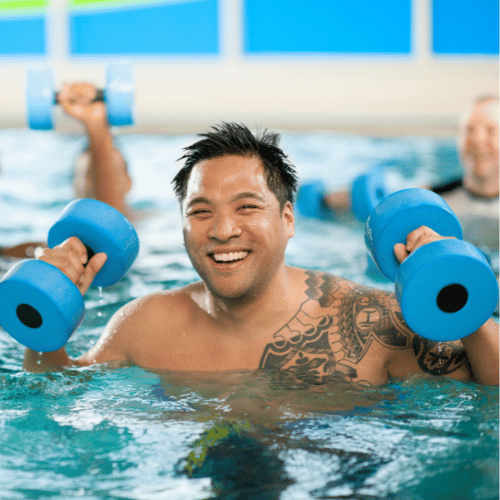Water activities can be incredibly effective in reducing stress and promoting relaxation. Here are some ways you can incorporate water activities into your routine to help reduce stress:
Swimming: Take a dip in a pool, lake, or ocean and enjoy the soothing and refreshing sensation of water. Swimming is a low-impact exercise that engages your entire body and releases endorphins, which are known as “feel-good” hormones. The rhythmic movements and the weightlessness of being in the water can help alleviate stress and tension.
“Water is the driving
force of all nature”
Leonardo Da Vinci

Water aerobics: Join a water aerobics class or perform water-based exercises on your own. Water aerobics combines cardiovascular exercise with resistance training, offering a gentle yet effective workout. The buoyancy of water reduces the impact on your joints, making it a suitable option for individuals with mobility issues or joint pain.
Stand-up paddleboarding (SUP): SUP involves standing on a wide board and using a paddle to propel yourself through the water. It offers a full-body workout while allowing you to enjoy the tranquility of being on the water. SUP requires focus and balance, which can help shift your attention away from stressors and promote a sense of calm.
Fishing: As mentioned earlier, fishing can be a relaxing and stress-reducing activity. Whether you’re casting from the shore, a boat, or a dock, the act of fishing can be meditative and provide an opportunity to connect with nature. The rhythmic casting and reeling, combined with the peacefulness of the water, can help calm the mind and reduce stress.
Beach walks: Walking along the shoreline of a beach is a simple yet effective way to reduce stress. The combination of fresh air, soothing sounds of waves, and the sensation of sand beneath your feet can create a calming environment. Take your time, breathe deeply, and immerse yourself in the present moment as you stroll along the water’s edge.
Water meditation or relaxation exercises: Find a quiet spot near the water and engage in meditation or relaxation exercises. Focus on your breath and the sounds of the water, allowing yourself to let go of tension and stress. You can also practice deep breathing exercises, progressive muscle relaxation, or guided imagery to further enhance the relaxation experience.
Be mindful of your swimming abilities, wear appropriate safety gear, and follow any rules or regulations set for the specific activity and location.
